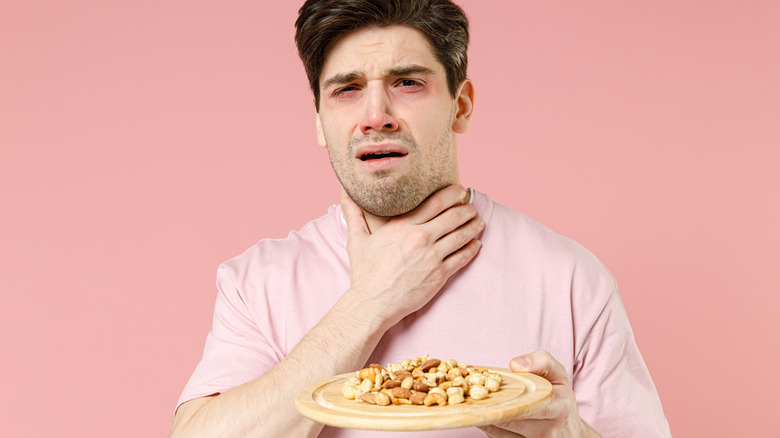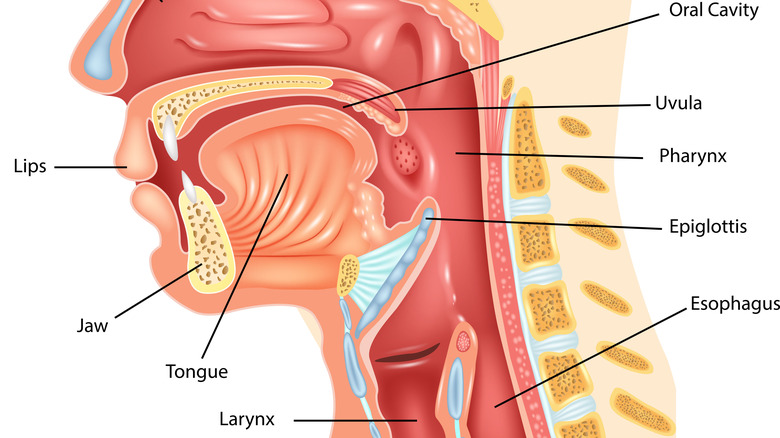What It Really Means When Food Goes Down 'The Wrong Pipe'
It's one of the most common problems we can suffer through at the table. You're eating something (perhaps not chewing as thoroughly as you should) when you feel something catch in your throat, leading you to a sudden fit of coughing and sputtering. It's just as likely to happen when you're taking a big swig of a drink, causing you to make a scene in front of all your dining companions. While the sensation of choking on something is undeniably unpleasant, it's often the embarrassment of the spectacle that leaves the biggest impact on us.
It could hardly be considered medical terminology, but the term "wrong pipe" is actually quite accurate. As HuffPost notes, we really do have two pipes descending from the back of our throats. The correct pipe, the one intended for swallowing food, is called the esophagus, while the wrong pipe, which should be reserved for breathing, is known as the trachea. But how do we manage to mix up these two passageways? How can you trust your body to do anything if it can't keep track of breathing versus swallowing? It turns out that food going down the wrong pipe is often our own fault, and it's generally easy to avoid.
Food going down the wrong pipe is called 'aspiration'
You can have aspirations of greatness, and you can also die by aspiration. Cedars-Sinai explains that, in a medical context, aspiration is what occurs when "something enters your airway or lungs by accident." Normally, when you swallow food or drink, it goes past your lips and into your pharynx (throat) before making its way down your esophagus to begin the digestive process. Your trachea, or windpipe, is also attached to the pharynx, but it is protected by a flap of tissue called the epiglottis. Normally, the epiglottis, along with your vocal cords, cover your trachea while you swallow to keep food, drink, and saliva from going down the wrong pipe, via the Cleveland Clinic.
The act of swallowing requires more than 30 unique muscles to work in tandem, and, as with all acts of coordination, it doesn't always go as planned. According to HuffPost, aspiration is often caused by a cognitive lapse, such as being distracted while swallowing. Physical factors also come into play, such as sensory abnormalities, or recently having throat surgery. Cedars-Sinai highlights a condition called dysphagia, which is difficulty swallowing, that is commonly caused by a stroke. In general, aspiration becomes a bigger problem as you age, and your muscles don't react as quickly as they once did. Fortunately, your body is prepared to take over in the event of a disaster.
What to do about aspiration
When you let some food or drink slip down the wrong pipe, your body reacts quickly, triggering coughing and gagging reflexes. The Cleveland Clinic explains that this goes along with a fight-or-flight response in which your body experiences a flood of adrenaline coupled with an increase in heart rate and blood pressure. In most cases, the coughing fit should cause you to expel whatever is blocking your airway, so make sure you cover your mouth lest you eject a partially-chewed meal onto your dining companions. However, in the rare cases that coughing doesn't dislodge the food in your trachea, you can develop pneumonia or bronchitis, which are serious issues requiring medical attention. The Cleveland Clinic suggests calling a doctor if you are still coughing two hours after something goes down the wrong pipe, or if you cough up blood at any point.
You know what they say about an ounce of prevention, and fortunately, it's pretty easy to avoid aspiration in the first place. You may have been taught not to talk with your mouth full because it's rude, but more importantly, it increases the chance of food going down the wrong pipe. It's also important to take your time while chewing and concentrate on your meal. There are certain foods you're more likely to choke on, particularly dry things like seaweed or popcorn, so be particularly diligent when eating those.


